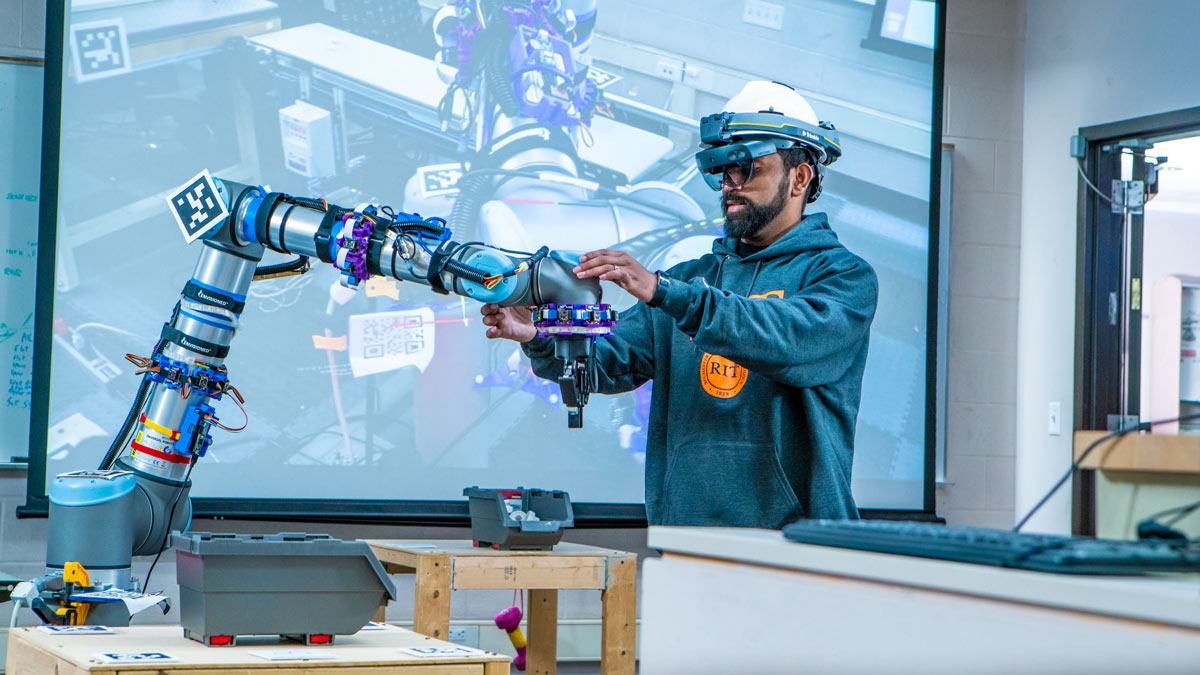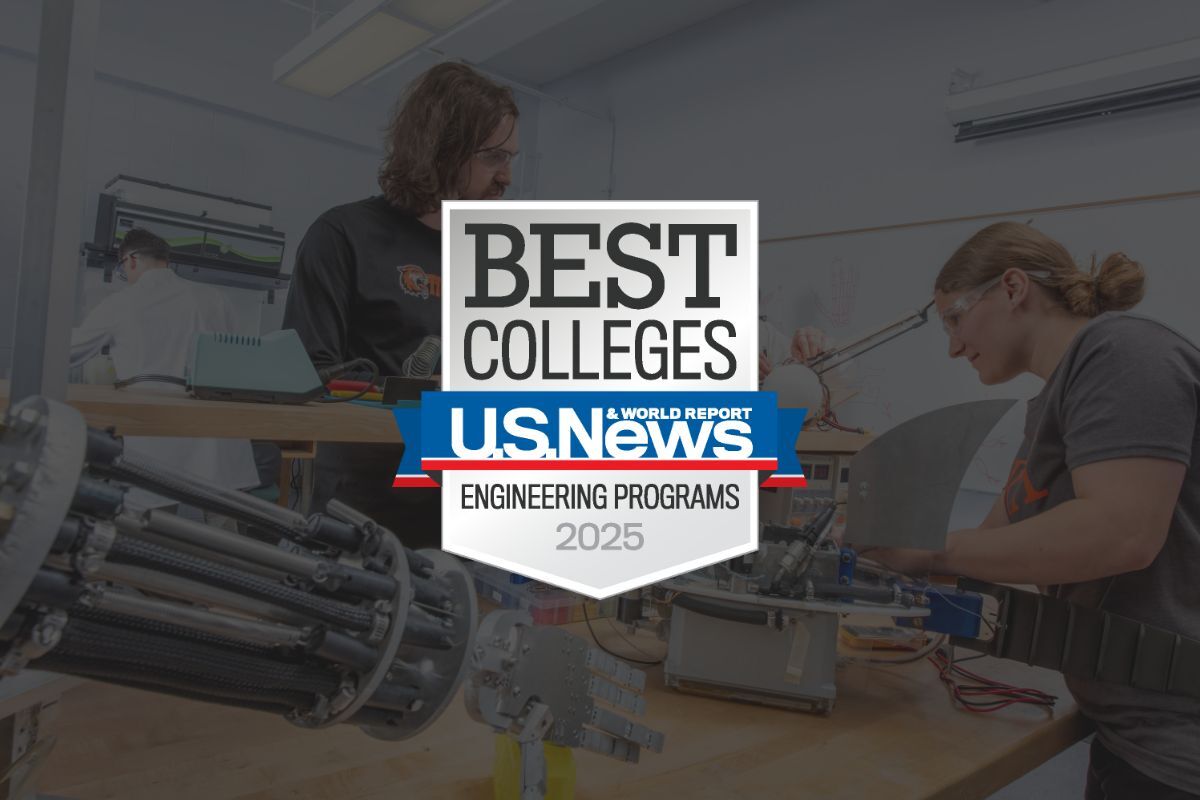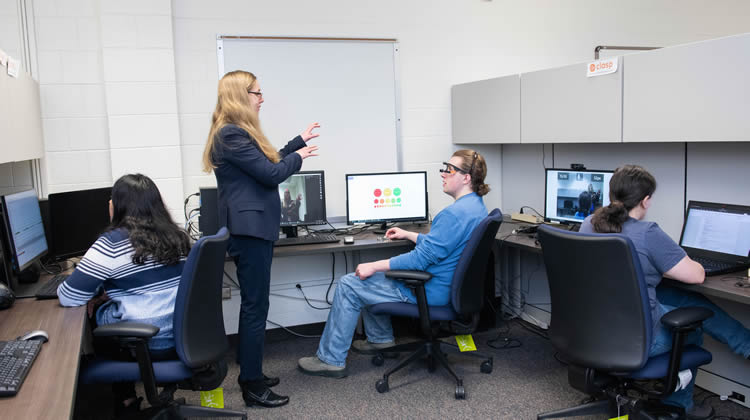Artificial Intelligence Option - Electrical Engineering BS

Artificial Intelligence Option
Electrical Engineering BS
- RIT /
- Rochester Institute of Technology /
- Academics /
- Artificial Intelligence Option - Electrical Engineering BS
RIT’s artificial intelligence option in electrical engineering provides you with the skills needed to design intelligent agents that can advance society.
Overview for Artificial Intelligence Option - Electrical Engineering BS
Why Study RIT’s Artificial Intelligence Option in Electrical Engineering BS
Dynamic Courses: Explore the foundations of artificial intelligence, biorobotics, and cybernetics.
Multidisciplinary Senior Design: Engage in a capstone learning experience that focuses on developing, implementing, or advancing different aspects of artificial intelligence.
STEM-OPT Visa Eligible: The STEM Optional Practical Training (OPT) program allows full-time, on-campus international students on an F-1 student visa to stay and work in the U.S. for up to three years after graduation.
The field of artificial intelligence (AI) has produced significant innovations that impact our everyday lives. From autonomous vehicles, smart assistants, and automated financial investing, to smart cities, health care, and logistics; AI has laid the foundation to push human civilization forward. The AI option provides you with the theoretical and practical skills necessary to design ethical intelligent agents that will continue to advance our society. This option is part of the electrical engineering BS.
The AI option has a programming-focused curriculum that allows you to study how agents can:
- Solve complex problems
- Make inferences and decisions
- Learn from data (classical and deep learning)
- Evolve over time
This course work is enhanced by understanding the ethical implications and societal impacts of your designs.
Courses in Artificial Intelligence in Electrical Engineering
The artificial intelligence option includes three core courses that cover the foundations of artificial intelligence. These courses cover:
- An introduction to artificial intelligence and machine learning topics with practical examples of data, tools, and algorithms. You'll understand basic artificial intelligence techniques and their applications to engineering problems.
- Explore the history of artificial intelligence and its development over the years, and investigate various artificial intelligence techniques, along with their applications and limitations.
- Investigate cybernetics and aspects of robotics and controls associated with applications of a biological nature.
You may select additional AI elective courses that cover topics such as:
- Pattern recognition
- Machine learning
- Digital signal processing
- Deep learning
- Principles of robotics
- Advanced robotics
Multidisciplinary Senior Design
Multidisciplinary Senior Design is a two-course sequence in your final year of study. It’s a capstone learning experience integrating engineering theory, principles, and processes in a collaborative team environment. Multidisciplinary student teams follow an engineering design process, which includes assessing customer needs, developing engineering specifications, generating and evaluating concepts, choosing an approach, completing systems and subsystems designs, and implementing the design to the extent feasible, for example, by building and testing a prototype or implementing a chosen set of improvements to a process. You’ll apply the knowledge you have learned in the classroom and from your co-op experiences to this design project. Students in the AI option are expected to work on a design project that focuses on developing, implementing, or advancing different aspects of artificial intelligence.
-
#51 Best Engineering Undergraduate Programs, 2025
RIT’s engineering majors are ranked among the Best Undergraduate Engineering Programs in the nation.
-
Meet us on campus
Learn about academics, co-op and internships, financial aid, and more at one of our on-campus open houses.
October 13 | October 25 | November 8
Careers and Cooperative Education
Cooperative Education
What’s different about an RIT education? It’s the career experience you gain by completing cooperative education and internships with top companies in every single industry. You’ll earn more than a degree. You’ll gain real-world career experience that sets you apart.
Co-ops and internships take your knowledge and turn it into know-how. Your engineering co-ops will provide hands-on experience that enables you to apply your engineering knowledge in professional settings while you make valuable connections between classwork and real-world applications.
All engineering majors are required to complete four blocks (48 weeks) of cooperative education experience. For students in the artificial intelligence option, your co-ops are expected to take place in companies that develop or integrate AI into their products or services. A sampling of companies where RIT students have completed co-ops related to artificial intelligence includes Amazon, Apple, Facebook, IBM, Microsoft, Tesla, Argo AI, and more.
Admissions and Financial Aid
This program is STEM designated when studying on campus and full time.
This option is part of the electrical engineering BS. Please visit the degree program page for admission requirements.
Financial Aid and Scholarships
100% of all incoming first-year and transfer students receive aid.
RIT’s personalized and comprehensive financial aid program includes scholarships, grants, loans, and campus employment programs. When all these are put to work, your actual cost may be much lower than the published estimated cost of attendance.
Learn more about financial aid and scholarships
Contact
- Ferat Sahin
- Department Head
- Department of Electrical and Microelectronic Engineering
- Kate Gleason College of Engineering
- 5854752175
- feseee@rit.edu
Department of Electrical and Microelectronic Engineering












